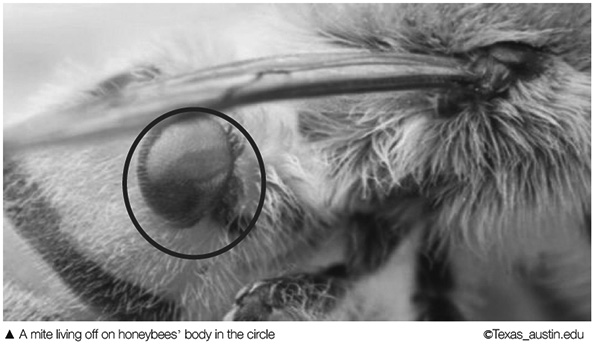“It’s a lot easier to take photos with flowers these days. Is it because there are no bees around here?”
This is what a CBT reporter recently heard from one of the people in the crowds on a spring day when cherry blossoms were in full bloom. In fact, it was hard to find any of the honeybees that should have started working early to mid-March when the forsythias began to bloom. At the same time, mainline news started reporting that, starting from Jeju island and the Southern States, honeybees had suddenly disappeared, and could easily be found fallen dead! Insects like bees or butterflies can sense even the weakest of signals of any kinds of natural disasters. Then, isn’t this current mass disappearance of bees a sign of some looming disaster that humans can’t perceive yet?
According to an investigation by the Korean Beekeeping Association, 390,517 beehives out of 2,276,593 were affected by the current crisis until March 2nd. The average number of honeybees living in a beehive are approximately 15,000, so the lost honeybees are about 6 billion in total. This is 18% of the total honeybee population in the nation. Hereupon the association conducted an investigation cooperating with the Rural Development Administration. The investigation focused on the whole country excluding the southern states where huge damage was already reported. The chairman of the association Yoon Hwa-hyeon, who visited damaged apiaries earlier said “The damage from the disaster was so serious that I could say ‘horrible.’ Because the honeybees usually start making honey in March, it’s uncertain how much honey we will be able to extract later. However, more than that, we are sincerely concerned about much greater future losses that we may suffer.”
An anonymous beekeeper in Ulsan said that the honeybee’s disappearance did not only occur this year. He further commented that “The number of honeybees from my 10 beehives had gradually declined and the bees from the last 3 beehives were finally lost early this year. I couldn’t find any clue where they went, or even if they died.” Thus, the CBT reporter will describe why they disappear and the aftermath of their disappearance that mankind will have to face.
Firstly, there are two possible causes which are mainly responsible for the disappearance of the bees. One is the climate crisis, and the other is insecticide used on farms.
Aspect of climate crisis, the problem can be found in the warm autumn to winter temperatures last year. Naturally, spring and summer are when honeybees are most active collecting honey. During these seasons, the beekeepers are also busy keeping honeybees safe from thunderstorms, viruses and parasites. According to the TV program Unanswered Questions, a queen bee hatches worker bees who only live and work in winter during the cold months. This is the time when bees stay inside the beehive to survive from cold. While they spend winter, the queen bee does not lay or hatch any eggs. However, last October to November bees left their shelter early, because of the relatively warm weather of over 10°C. As a result, those bees who prematurely left their shelter died or disappeared after the temperature fell again. In case of such a dramatic loss of population, the amount of honey that a farm can produce is really limited, and the honey market may go into a panic. Furthermore, honeybees are responsible for the pollination of 30% of the 1500 plant species that mankind can grow, especially in the domestic fruit market. The 90% of fruits cultivated in domestic glasshouses, like strawberries and watermelons, are pollinated by honeybees. If the population of honeybees slowly decreases, artificial pollinations will become inevitable. However, artificial pollination is limited due to some problems including human resources. If the population loss continues over a long period of time, it may lead to a severe lack of fresh food, fruits and vegetables, which will lead to a food shortages and famines.
The last cause of the disappearance is, contradictorily, a mite insecticide for honeybees. According to the Animal Hygienic Laboratory of the North Gyeongsang Province, a mite is parasitic to the larvae and the imago of honeybees and keeps slowing down or stopping the growth of bees. When they get into the imago’s body, they cause a malformation of the body and it loses the ability to get up to 30~46% of the honey. In addition to being a parasite that affects the bodies of the bees, mites take over the space in beehives. Farmers use chemical insecticide to get rid of mites, the most common chemical control being the one used for ticks based on fluvalinate. However, since the damage from mites is increasing and the farmers have been using similar product-based insecticide for years, mites have become increasingly immune to it. This causes the farmers to use more and more pesticide to eradicate the mites, which eventually leads to harming the honeybees. Overdose of insecticide arouse the bees into some abnormal behavior, and causes the decline of memory and flying ability. In addition, the queen bee can experience the decline of breeding ability. For this reason, the institution recommends using two pesticides alternatively.
Honeybees have one of the most important roles in people’s ecosystem, which is the pollinating of many flowers and crops. To reduce the disastrous loss of bees requires continuous attention from the government to support the farms and investigate the causes of the decline. Also, as dependent inhabitants of the Earth, all citizens should be aware of and alert to these series of environmental problem.
By Ji Jae-lim l jlim0714@cbnu.ac.kr


 All
All Society & Global
Society & Global






 Ji Jae-lim
Ji Jae-lim











